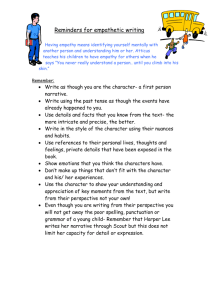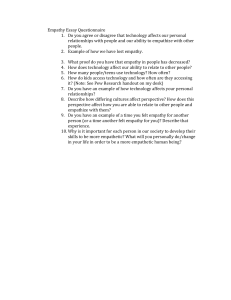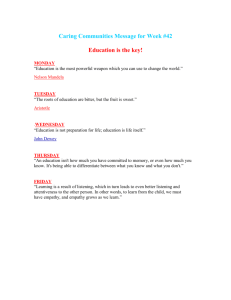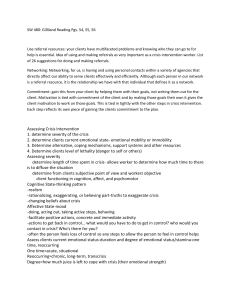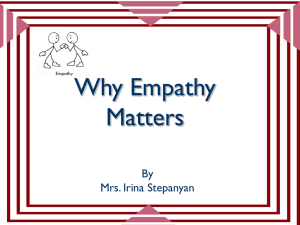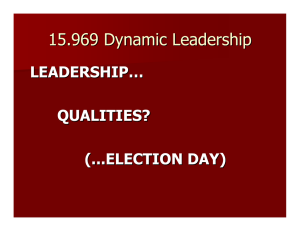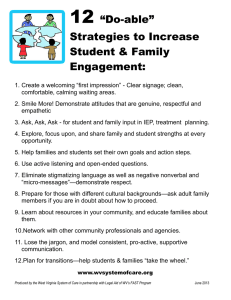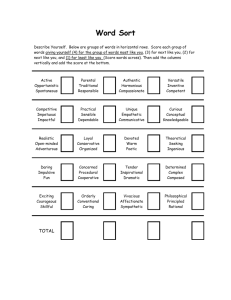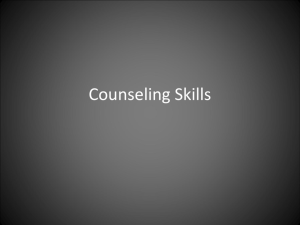Document 14093601
advertisement
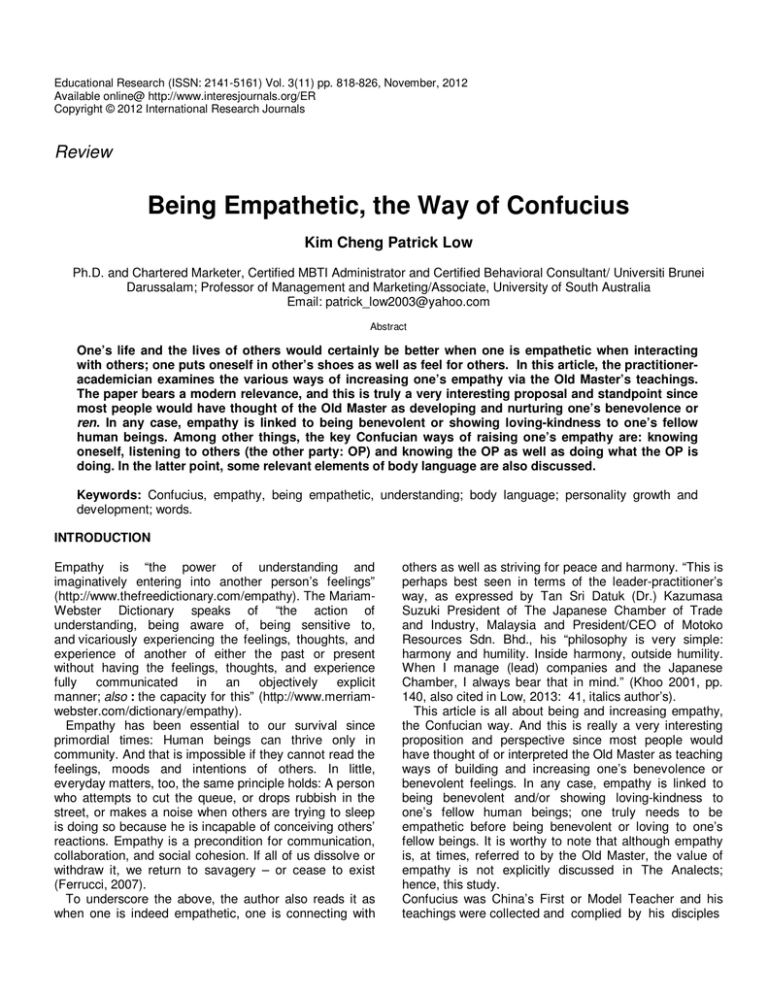
Educational Research (ISSN: 2141-5161) Vol. 3(11) pp. 818-826, November, 2012 Available online@ http://www.interesjournals.org/ER Copyright © 2012 International Research Journals Review Being Empathetic, the Way of Confucius Kim Cheng Patrick Low Ph.D. and Chartered Marketer, Certified MBTI Administrator and Certified Behavioral Consultant/ Universiti Brunei Darussalam; Professor of Management and Marketing/Associate, University of South Australia Email: patrick_low2003@yahoo.com Abstract One’s life and the lives of others would certainly be better when one is empathetic when interacting with others; one puts oneself in other’s shoes as well as feel for others. In this article, the practitioneracademician examines the various ways of increasing one’s empathy via the Old Master’s teachings. The paper bears a modern relevance, and this is truly a very interesting proposal and standpoint since most people would have thought of the Old Master as developing and nurturing one’s benevolence or ren. In any case, empathy is linked to being benevolent or showing loving-kindness to one’s fellow human beings. Among other things, the key Confucian ways of raising one’s empathy are: knowing oneself, listening to others (the other party: OP) and knowing the OP as well as doing what the OP is doing. In the latter point, some relevant elements of body language are also discussed. Keywords: Confucius, empathy, being empathetic, understanding; body language; personality growth and development; words. INTRODUCTION Empathy is “the power of understanding and imaginatively entering into another person’s feelings” (http://www.thefreedictionary.com/empathy). The MariamWebster Dictionary speaks of “the action of understanding, being aware of, being sensitive to, and vicariously experiencing the feelings, thoughts, and experience of another of either the past or present without having the feelings, thoughts, and experience fully communicated in an objectively explicit manner; also : the capacity for this” (http://www.merriamwebster.com/dictionary/empathy). Empathy has been essential to our survival since primordial times: Human beings can thrive only in community. And that is impossible if they cannot read the feelings, moods and intentions of others. In little, everyday matters, too, the same principle holds: A person who attempts to cut the queue, or drops rubbish in the street, or makes a noise when others are trying to sleep is doing so because he is incapable of conceiving others’ reactions. Empathy is a precondition for communication, collaboration, and social cohesion. If all of us dissolve or withdraw it, we return to savagery – or cease to exist (Ferrucci, 2007). To underscore the above, the author also reads it as when one is indeed empathetic, one is connecting with others as well as striving for peace and harmony. “This is perhaps best seen in terms of the leader-practitioner’s way, as expressed by Tan Sri Datuk (Dr.) Kazumasa Suzuki President of The Japanese Chamber of Trade and Industry, Malaysia and President/CEO of Motoko Resources Sdn. Bhd., his “philosophy is very simple: harmony and humility. Inside harmony, outside humility. When I manage (lead) companies and the Japanese Chamber, I always bear that in mind.” (Khoo 2001, pp. 140, also cited in Low, 2013: 41, italics author’s). This article is all about being and increasing empathy, the Confucian way. And this is really a very interesting proposition and perspective since most people would have thought of or interpreted the Old Master as teaching ways of building and increasing one’s benevolence or benevolent feelings. In any case, empathy is linked to being benevolent and/or showing loving-kindness to one’s fellow human beings; one truly needs to be empathetic before being benevolent or loving to one’s fellow beings. It is worthy to note that although empathy is, at times, referred to by the Old Master, the value of empathy is not explicitly discussed in The Analects; hence, this study. Confucius was China’s First or Model Teacher and his teachings were collected and complied by his disciples Low 819 and form the basis and source of The Analects, which later became the textbook for future generations of disciples. And the empathy-building/ nurturing ways are to be derived from The Analects and other Confucian sources and writings. Paper’s Aim and Objectives So far, no or not many of such writings have been made on practicing empathy, the way of Confucius. The objectives of the paper are thus as follows: One is to examine the ways in which one can nurture or increase one’s empathy based on or inferred from Confucius’ teachings. Two, is to pick and apply some of the Master’s teachings or sayings – if any – to one’s self-talk or checklist so that one can boost one’s empathy or, simply, to live happily with others; and others with us. And three, is to list the benefits and advantages of being an empathetic leader or person. Literature Review “We all want to be valued” (Donadio, 2012: 13) and not “treated as unimportant” (Manning and Curtis, 2003: 150). People really want to feel important (Carnegie, 1982). They want to be listened to, and leaders need to always listen to what their people have to say. (Quick and Nelson, 2013; Goulston, 2010; Mithun, 1991). In this competitive age of machines, robotics and high technology (New York Times, cited in The Straits Times, 2012: A18; Kiviat, 2008; McDaniel and Gitman, 2008), not being empathetic can make a leader or a person being perceived as seemingly cold and uncaring. If this is so, high-tech and low-touch can be demotivating, if not discouraging, and dehumanizing; it creates little connection, rapport or link between the leaders and the followers. Any person especially leaders thus need to enhance or boost their relationship skills (Low, 2001; Bolton, 1979) including being empathetic, friendly and open if they want to motivate or better influence people. And people should indeed not be alienated, cut off and separated from leaders. It is worthy to note that “empathy is the best means of improving any relationship. Have you ever witnessed a quarrel in which neither party had the least intention or ability to see things from the other's point of view? How painful. Yet it happens, and we see it day after day in the arena of international relations. Empathy is what is missing most, and what would most help resolve age-old, dangerous racial problems and prejudices. That is why it is so important at this time.” (Ferrucci, 2007: 109-110). It is good to “step outside of yourself” and give (Ricotti, 2012: 153). When one practices empathy towards others, one gives understanding, wen, consideration, friendships and/or personal warmth as well as compassion. And what one gives live. The secret to living is giving (Mason, 2003; Jamal and Mckinnon, 2006). “A good way to judge a man is by what he says. A better way is by what he does. The best way is by what he gives.” (Mason, 2003: 167). Success also lies in giving – such as giving an ear or a thought, being empathetic (Harris, 1998). At the workplace, many ways prevail to motivate people, and leaders and managers need to be empathetic. As a leader who cares – taking a personal interest in one’s employees will motivate them to work hard. (Fairweather, 2011). Nonetheless, leaders and managers cannot assume or take for granted they understand employees’ needs; they should reasonably seek to identify those needs. They should acknowledge and appreciate the wide variety of needs that motivate employee behavior, and in fact take the time to learn individual needs by asking employees and being open to input (Quick and Nelson, 2013: 165). In this regard, managers should also be empathetic and sensitive to ethnic, national, gender, and age differences. As humans, all of us certainly want the Golden Rule (Lau, 1979; Zhou, 2005: 135) to be applied; we want others to empathize with us as much as we would empathize with them; we want to have that good feeling. For Confucius, an empathetic person is ordinarily a warm person; he or she has the warmth or is wen (溫); here, wen also means there are added qualities of softness, being gentle and that the person can be really depended upon Empathetic, “Confucius did not sing for the rest of the day as he usually would do after he had wept at a funeral” (The Analects of Confucius, VII, verse 10). This can be taken as such: Should one’s loved ones or the other party (OP) is sad, one should not do the opposite; if one is empathetic, one should know or understand one’s loved ones or the OP, putting oneself in the loved ones/ OP’s shoes; one should not become loud, noisy, disturbing or doing things that may upset one’s loved ones or the OP. And at the end of the day, rituals are done with feelings of sincerity rather than perfunctorily. RESEARCH METHODOLOGY This research is based on a series of interviews – each time approximately 30 to 50 minutes though some interviews might stretch to an hour plus – conducted with a pool total of forty-three Chinese entrepreneurs, business-owners and employees from Small and Medium Enterprises (SMEs) in Brunei, Malaysia and Singapore, and the period of study was from 18 August 2011 to 16 February 2012. The researcher took advantage of his leave trips to Malaysia and Singapore to access interviewees to collect data. The study relies on the qualitative research method, the interviewing method. It is 820 Educ. Res. Table 1. The Interviewees’ Responses on “the Confucian ways of increasing one’s empathetic feeling” Responses Knowing Oneself “Need to be aware; I must know myself first.” “I must start with myself.” “There should be more self-understanding before one can really empathize.” Listening to Others (the Other Party) “Listening is vital.” “He or she should listen and be listening if he or she is to be empathetic to a person”. “One should also listen with one’s heart.” Knowing the Other Party (OP) “To be empathetic is to know the other party well; if we know the other side well, we can relate with him or her better.” “If we know the OP, we should not do things that may offend him.” Doing What the OP Is Doing “Doing what the OP is doing to show one’s empathy; there’s some elements of body language.” “If we need to show empathy, we should be doing what the OP is doing” Knowing and Fulfilling the Needs of the OP “We normally see how I can satisfy my people or the other side.” Being Sensitive in Our Words to the OP “I need to be aware of the words I use”; “I need to choose and use the right words.” Practicing Patience “My supervisor shows that she is patient, and this, to me, is one of her empathetic ways; to be patient is also to be kind to her staff.” Showing Care and Concern “If there are any disagreements or conflicts among us, they are easily settled with empathetic concerns by our superiors, and this is helpful.” “Generally-speaking, my leader would look and focus at finding solutions, resolving the problem(s) rather than being fault-finding. That is what I would say as a caring or loving attitude, and this helps.” “An empathetic leader is caring and she seems humble to me. I’ll be open more to a caring supervisor.” “(There is) the need to show compassion”. worthy to note that similar to Low’s (2006) studies, being assured of confidentiality and anonymity, the interviewees expressed themselves freely. Often, small talk, casual comments or a light conversation on interviewees’ personal likes and interests, detected in previous interactions or previous telephone calls, would serve as a springboard for further discussions on the interview content. This interview method is helpful since it enables much qualitative data to be collected from the interviewees. To get more information and data from the various interviewees, open questions were deployed (Cavana, Delahaye and Sekaran, 2001); they were crafted as follows: 1. What attributes about Confucian notion of empathy that strikes you? Number of Interviewees (out of a total number of 34) Percentage (%) of Interviewees 34 100 31 91.18 31 91.18 30 88.23 28 82.35 28 82.35 26 76.47 25 73.53 2. What do you think of the Confucius’ notion of empathy? 3. For what reason(s) do you think a person should act or be empathetic? 4. What do you perceive as the Confucian ways of increasing one’s empathetic feelings towards others? 5. What then are the benefits of being empathetic? (Table 1) ANALYSIS AND DISCUSSIONS Based on the findings, the following are the key Confucian ways that would build the empathy of an individual who is familiar with Confucius especially those Low 821 All thirty-four interviewees expressed the “need to be aware; I must know myself first”, “I must start with myself” and that “there should be more self-understanding before one can really empathize.” One should know oneself; here, the author would like to highlight this wise saying that is said to be attributed to Buddha; accordingly, a fool who is not aware that he is a fool is indeed befitting to be a fool. If a fool knows that he is a fool that he has transcended his foolishness; now, he is wise. Here, 100 percent or all thirty-four interviewees unanimously spoke of “being self-aware” and “knowing oneself” as a starting point before understanding others. They indicated “the importance of knowing oneself, we can then understand others better” (several interviewees’ inputs). The Master said, “…look within and examine your own self.” (Confucius – The Analects, IV: 17, Lau, 1979: 74). Lao Tzu, the Chinese philosopher once said (cited in Low, 2011: 12) that, “to understand another is a show of great intelligence, to understand oneself is a show of genius”. One should really know oneself, one’s values and indeed make one’s life count (Low, 2011). And these will definitely up one’s empathy and will also make one understands others better. “A true gentleman should comment on one’s own shortcomings rather than those of others.” (Confucius, cited in Zhou, 2005: 17). The self-talk or question posed here is that before a person judges another person or others, he or she needs to ask if he or she would, in similar situation, do the same thing as what was done by the other person. The question is meant to make one feels empathetic and understand the other person’s perspective or viewpoint. People who listen badly understand badly; there is indeed the need to learn to concentrate on the Other Party (OP). Watch his face, eyes, gestures, and body language. Listen actively, nod in agreement, or smile to draw the other person out (Moss, 2010) and show interest (French, 1994). “Of all the communications skills, listening is arguably the one which makes the biggest difference. The most brilliant and effective speaker ultimately comes undone if he/she fails to listen properly.” (http://www.businessballs.com/empathy.htm). Among other things, he or she should not be in the states of passive listening (noise in the background), pretend listening or “responsive listening” (pretends to listen, making nods, etc.) or bias listening (intentionally disregarding or dismissing the other person's views) (http://www.businessballs.com/empathy.htm). 31 out of the total of 34 interviewees (91.18 percent) agreed that “he or she should listen and be listening if he or she is to be empathetic to a person”. “One should... listen with one’s heart”, thus, giving a high-touch to one’s communications and relationships with others, especially so, since “empathy is lacking in today’s competitive environment” (several interviewees’ inputs; New York Times, cited in The Straits Times, 2012: A18; McDaniel and Gitman, 2008; Low, 2001). Listening is indeed more than hearing. (Bolton, 1979); these are similar to Maxwell and Parrott’s (2005: 100-104) key points that one should unclog one’s ears, remove barriers of communication and focus on the other party. One listens to the other party with one’s heart; one is in fact listening actively – one listens to understand. This author would take it that listening can lead to communications being “less about information than it is about facilitating kinship within the culture” (Drucker, 1973, 1974; also cited in Baldoni, 2003: 8). A vital checkpoint here one needs to ask – Am I paying attention to the OP (my people)? Am I listening to the other person? Am I focusing on the OP (my people)? 2 3 who know the Master’s philosophy and teachings well. 1 Knowing Oneself Listening to Others (the Other Party) One does more than hear. One listens (Mason, 2003). “Listening is vital” (an interviewee’s inputs); if one does not listen to another, how one would understand the person, let alone be empathetic. There should not be “misunderstood listening”, that is, unconsciously overlaying one’s own interpretations and making things fit when they do not (http://www.businessballs.com/empathy.htm). In this case, one is certainly not empathetic, and certainly so, one is imposing on others – be it in terms of one’s views or any other things. The Old Master once said, “Never impose upon others what you don’t wish upon yourself.” (Zhou, 2005: 5). Knowing the Other Party (OP) Thirty-one interviewees or 91.18 percent opined that “to be empathetic is to know the other party well; (and) if we know the other side well, we can relate with him or her better.” (Several interviewees’ inputs). One can certainly take it that the Old Master was empathetic in his ways and overall relationships with others. In The Analects of Confucius, (VII, verse 10), “Confucius did not sing for the rest of the day as he usually would do after he had wept at a funeral.” “If we know the OP, we should not do things that may offend him.” (One interviewee’s inputs). If the other party (OP) is sad, then one does not do the opposite; if one is 822 Educ. Res. empathetic, one should know the OP, putting oneself in the OP’s shoes; one should not become loud, noisy, disturbing or doing things that may upset the OP. 31 out of the total of 34 interviewees (91.18 percent) agreed that to be empathetic, one should know the OP, and take actions or do things to find out more about the OP. Here, logically one needs to ask: Am I doing something that I should not be doing or things that would upset or disturb the OP? 4 Doing What the OP Is Doing Thirty interviewees or 88.23 percent of all the interviewees expressed “doing what the OP is doing to show one’s empathy; there’s some elements of body language”. They spoke of “if we need to show empathy, we should be doing what the OP is doing” (several interviewees’ inputs). It appears that we can also infer that even at the time, the Old Master possibly knew about body language – doing what the other party (OP) is doing. A person is in fact said to be empathetic when he or she is doing what the other party (OP) is doing. In The Analects of Confucius, (VII, verse 9), “Confucius never ate enough food at a meal when he found himself seated next to someone who had been bereaved”. One thus empathizes with another by showing it out in one’s behaviors or actions. Akin to the saying, “flattery is the best form of imitation”, it is very pleasant or wonderful when others do what one is doing; one tends to feel flattered, if not good. For Confucius, it is vital that one wishes upon others what one wishes upon oneself; do onto others what one wants others to do onto oneself. Mirroring the OP’s words used, incorporating them into your conversation (French, 1994) and body language (http://www.askwomennet.com/mirroring-bodylanguage.html; Pease, 1994) are powerful tools that enable one to build closeness and understanding with another person almost instantly.. According to NeuroLingusitic Programming (NLP) experts, this mirroring technique will build trust and liking in the person with whom one is communicating (http://www.reading-bodylanguage.co.uk/ten-body-language-secrets.html). Here are further explanatory notes on body language, the unspoken language or – technically known as kinesics (pronounced ‘kineesicks’): Body language can give a person some understanding and empathetic insights into another person (OP); if one looks at the overall, the words spoken, the gesture-clusters deployed, and the congruity of body movements and gestures becomes considerably simpler to understand (Nierenberg and Calero, 1980; Pease; 1994; French, 1994). This contributes greatly to seeing the overall meaning, and one understands the OP better and more empathetically. When two persons are mirroring each other’s gestures, it can be reasonably taken that they are discussing a topic upon which they have or are sharing the same thoughts and feelings. If one uncrosses one hand and the other follows; and if one puts his hands in his pocket, the other will imitate, and this mimicry will continue for as long as the two men are in agreement. This copying also occurs among good friends or people at the same status level (there is empathy or same thoughts and feelings between the two persons). It is common to see married couples walk, stand, sit and move in identical ways or in what Pease (1994: 169) calls “mirroring”. Speech pace or speed is also another way of mirroring or “synchronizing” to create mutual feeling of empathy. When one is speaking with someone, one first matches one’s pace of speaking, then gently change one’s pace slower or faster - and see if the other person follows one. Often they will do. (http://www.businessballs.com/bodylanguage.htm#mirroring-body-language). It thus follows that one needs to check: Am I doing something what the OP is doing? Or at least, check if one’s body language is in sync or matches with the OP? If one is leading or dealing with people, one needs to be friendly, and one way to be friendly is by the body language way. And so we will probably want to use the kind of body language that will make them feel good about us and vice versa. (Quilliam, 1996). Am I “getting in tune” with the OP? (http://www.businessballs.com/bodylanguage.htm#mirroring-body-language). 5 Knowing and Fulfilling the Needs of the OP Twenty-eight interviewees or 82.35 percent of the total number of interviewees agreed on “knowing and fulfilling the needs” of the other party. “We normally see how I can satisfy my people or the other side.” (several interviewees’ comments). A good example is that of Mahatma Gandhi - he was “not only empathetic but he also understood the needs of the people. Having the ordinary people touch, Gandhi was able to connect with the masses, and the people trust him. They identified with him. For the Mahatma, he felt that he had to live or be with them, thus, he dressed like one of them, just wearing a lion-cloth (a Indian peasant’s wear and not wearing a Western suit, coat and tie)” (Low, 2010: 114; Fischer, 1954; italics author’s). A person possessing empathy makes a good leader; for Confucius, such a person, a gentleman should be cautious when speaking and be responsive or quick to act (The Analects of Confucius, IV, verse 10). It is important to note that leaders who take the time to understand the needs of their people can provide them Low 823 with the support they need to press ahead, to deal with the challenges or issues that might be holding them back from accomplishing their goals. By comprehending and giving people with what they require to succeed or win, leaders can build a sense of trust, thereby strengthening the relationships they have with their people and accordingly, the relationships their people have with one another, leading to greater collaboration and increased productivity (http://www.tanveernaseer.com/whyempathy-matters-in-leadership/). The checkpoint or questions posed here are thus: Do I know the OP’s (my people’s) needs? What can be empathetically done by me to fulfill the OP’s (my people’s) needs? 6 Being Sensitive in Our Words to the OP Twenty-eight interviewees or 82.35 percent highlighted the importance of being sensitive to the words used to show one’s identification and responsiveness to the OP. Several interviewees made these comments: “I need to be aware of the words I use”; “I need to choose and use the right words.” When dealing with people, a Confucian leader is empathetic. Empathy acknowledges the sameness as the other is feeling; while it requires a leap out of one’s life and exposes one to the other’s pain, empathy fine-tunes one’s heartstrings. Indeed one’s heart expands to make room for the other’s (customer’s) feelings. “Bigger is better” (McCarty, 2009), and it includes other people. As many sales experts, such as Girard (1989), have highlighted that the customers wear invisible signs: “I am important, respect me”, and being bigger gains the customer’s liking, if not, favor towards the service provider. Indeed, when speaking or talking to our followers or customers (Low, 2010a), “bigger” to this author means that we, being magnanimous, should respect them, and what more, be empathetic, thinking carefully; in our actions, and we must indeed consider the consequences. This is the most critical thing to remember in all our interactions (Yu, 2009). One needs to be careful in one’s words when talking to one’s loved ones as well as others including OPs during negotiations (Low, 2010b). In The Analects, XIX, verse 25, we uncover that Confucius stressed on the need to be careful with one’s words. “Tzu-kung said, ‘The gentleman is judged wise by a single word he utters; equally, he is judged foolish by a single word he utters. That is why one really must be careful (hence be empathetic) of what one says.” (Lau, 1979: 157; italics author’s). These tie-in with what Thornely and Lees (1991: 131) have highlighted, that is, because being successful or winning with words, especially in sales, means being sensitive to other people’s wants and moods, as well as being able to respond to them, effective salespeople not only make friends effortlessly, but also make good friends. One thus needs to ask: Am I empathetic in the use of my words when talking to others? Am I using or applying the right words to show my empathy towards the OP? 7 Practicing Patience Twenty-six interviewees or 76.47 percent expressed the need to practice patience to show or exercise empathy. One interviewee specifically pointed out that her “supervisor shows that she is patient, and this is, to (her), is one of her empathetic ways; to be patient is also to be kind to her staff.” One needs to be patient, allowing plenty of time (French, 1994). To be empathetic, one needs patience and show such a quality to one’s OP; if one is not patient, one may appear as if one is proud, not caring, abrupt, arrogant and even egotistic, and in this respect, Confucius highlighted that the “lack of patience in (discussing) small matters will eventually bring destruction to the overall plan.” (Analects of Confucius, XV: 27; italics author’s). So a leader/manager needs to ask him or herself: Am I patient in discussing issues with the OP (my people)? Do I give my OP sufficient time? Am I patient enough to listen to the OP (my people)? 8 Showing Care and Concern “What we want in our relationship is for another person to listen, with genuine interest, to our story, our suffering, our hopes and our dreams. We want them to care about our life – and not because of some self-serving agenda on their part” (Donadio, 2012: 14, italics author’s emphasis). Twenty-five interviewees or 73.53 of the total number of interviewees spoke of showing care and concern; they highlighted “the need to show compassion”. Several interviewees pointed out that, “If there are any disagreements or conflicts among us, they are easily settled with empathetic concerns by our superiors, and this is helpful.” “Generally-speaking, my leader would look and focus at finding solutions, resolving the problem(s) rather than being fault-finding. That is what I would say as a caring or loving attitude, and this helps.” Confucius highlighted that, “A true gentleman is always open-minded while a petty man is always anxious” (Zhou, 2005: 6). An empathetic leader ordinarily shows care and concern while fulfilling the needs of their people. He or she “is caring and …seems humble to me. I’ll be open more to a caring supervisor” (An interviewee’s inputs). 824 Educ. Res. Figure 1. Shows being empathetic, the confucian way The empathetic person may ask, “I understand the issues you are facing”. Indeed, perceived as unselfish and openminded, others are likely to open themselves up and express more to an empathetic, responsive person. As the empathetic person (leader) shows his concern, the OP (psychologically or sensitively) “open(s) up and share(s) a personal moment” (Baldoni, 2003: 102). The feeling person (leader) increases his or her understanding of the OP; both subsequently partake or enjoy heart-to-heart talk while discussing the issue(s). “Though being capable and well learned, he (the leader being modest and empathetic) asked those less capable or learned for advice” (Zhou, 2005: 63; italics author’s). Bearing in mind that showing care and concern (perceived as being humble) begets openness and more dialogues, one should thus check if one is showing care and concern when relating or interacting with the OP. Also to ask: Am I gentlemanly (lady) enough? For Confucius, the leader (practicing benevolence; Low, 2010c; 2008), or for that matter, a person should be compassionate, showing care and concern (Low, 2010c, 2008; Yu, 2009). See Figure 1 – it gives a summary of being empathetic, the Confucian way; the summary is put forth before discussing the benefits of being empathetic. The Benefits of Being Empathetic “The employers or the managers (leaders) need to know and understand their employees well, be empathetic enough so that they can (further) motivate, if not inspire, their employees.” (Low, 2013: 39; italics author’s). And “in ‘feeling culture’ Brunei, being empathetic (balas hati) is beneficial, more so, where and when social conversations and understanding is seen as important”. “Employees are willing to open up” and “people are more willing to talk when their leaders show empathy”; and these coincide Baldoni’s (2003) reference to the people’s opening up and sharing personal moments that will enable them to understand the issue(s) more vividly and sometimes viscerally. Bridges are built and rapport is established. “When the leaders show their empathy and understanding, they show that they care.” (several interviewees’ inputs). “As a leader, being empathetic is an asset.” (several interviewees’ inputs). Empathy and being empathetic is all about how to win with people.“A leader must (really) understand the inner workings of human nature” (Matsushita, 1991: 154). And leadership is about raising its influence (“the influencing process of Low 825 leaders and followers to achieve organizational objectives through change”; Achua and Lussier, 2010: 6), building good relationships (Low, 2001) and persuading people to get results and genuinely serving as well as doing things for others; leaders stand tall. Leaders, with good communication ways, listen without assuming and/or interrupting (Achua and Lussier, 2010), and when they listen with a proper attitude and listen empathetically, they “help others feel important, admired and appreciated”. Ordinarily, empathetic leaders listen to what their people “say with obvious admiration and appreciation so that they know (the leaders) consider what they say to be important” (Kopmeyer, 2003: 160). Listening is indeed “a way to help others in other ways than to make them feel important, admired and appreciated”; it also enables them to let off the steam or tensions and stresses by “talking it out” (Kopmeyer, 2003: 160). Leading in such a way is overall very influential, attractive and appealing. “Listening to employees plays a very important role in maintaining their morale and commitment and support to the managers and the organization.” (Low et al., 2012: 600). “When (people) seek understanding, they expect understanding. One should not only understand them but it would be better if one also empathizes with them” (Business Accent, 2009; Low et al., 2012). Being empathetic is the fine art of “winning people” (several interviewees’ inputs). “Understanding and being empathetic… coming from leaders and managers can be very motivating”; “(these are) soft power ways and a leader’s winning ways” (several interviewees’ inputs; Quick and Nelson, 2013). According to Mencius (Confucius’ later disciple), when men are subdued by force, their hearts are not truly won over; they submit just because they do not have enough strength to fight or resist. However, when men are won by virtue (such as being empathetic and caring), they submit or accept sincerely and are glad in their hearts (Tsai, 1991: 27; italics author’s; Zi, 2009). CONCLUSION Empathy is being human, and Confucianism is humanism (ren) (Fung, 1948; Lin, 1994; Low, 2011a). “A gentleman is conscious only in the knowledge of others’ comfort; the mean is conscious only of his own comfort” (Chew, 2000: 2; Low, 2008: 34). This author agrees with the fact that the capacity to empathize in all of us is great (http://www.tanveernaseer.com/why-empathy-matters-inleadership/), and everyone is essentially good (Zi, 2009; Ng, 1991). We can, in fact, grow our empathy, listen, show people we care and focus our attention and interest to others around us especially our loved ones. We should connect both verbally and nonverbally, interacting with others; and this can and should be part of our everyday communication (http://www.tanveernaseer.com/why-empathy-matters-inleadership/). For the author, to empathize and practice empathy is to operationalize the Confucian value of compassion. Confucius stressed much on loving and showing care and compassion to one’s fellow human beings (Low, 2011a, 2010c; 2008; Yu, 2009; Zhou, 2005; Chew, 2000; Tsai, 1999; Lin, 1994; Fung, 1948). Confucius pointed out, “If you love others, they will love you; if you despise others, they will despise you. Since you know how to treat yourself, you should know how to treat others.” (Zhou, 2005: 135). Overall, when one practices empathy or enhances one’s empathetic feelings, one attempts to apply the Golden Rule. In our relationships with others, one ordinarily does not do to others what one does not want others to do onto one. And one normally does to others what one wants others to do onto one. It is also worthy to note that when one cultivates empathy, understanding and responsiveness, one is in fact growing or self-cultivating oneself. One grows from learning or understanding oneself to understanding others. When one practices empathy, it enables one to better respond to others, that is, to know, understand and even appreciate others better or fittingly. One can then better relate or interact with others while enjoying good interpersonal relationships. And even better, on one hand, one is able to fulfill the needs of others and on the other hand, nicer or more pleasant still, since it takes two to tango, when others also understand one better. REFERENCES Achua CF, Lussier RN (2010). Effective Leadership, South-Western Cengage Learning: Canada Baldoni J (2003). Great Communication Secrets of Great Leaders, The McGraw-Hill Companies: USA. Bolton R (1979). People Skills, Simon and Schuster, Inc.: USA. Business Accent (2009). ‘Management tips: Listening to your employees’, BusinessAccent.com dated 23 July 2009. http://businessaccent.com/2009/06/23/management-tips-listeningtoyourCarnegie D (1982). How to win friends and influence people, Pocket: USA. Cavana RY, Delahaye BL, Sekaran U (2001). Applied Business Research, Qualitative and Quantitative Methods, John Wiley and Sons: Australia, pp. 142; 134-135. Chew KHP (2000). A Gentleman’s Code, Graham Brash (Pte.) Ltd.: Singapore. Donadio G (2012). Changing Behavior: Immediately Transform Your Relationships with Easy-to-learn, Proven Communciation Skills, SoulWork Press: Boston. Drucker P (1973, 1974). Management: Tasks, Responsibilities, Practices, Harper Business: New York. 826 Educ. Res. Fairweather A (2011). ‘Be a leader who cares’, The Recruit, The Straits Times, 5 December 2011. Also available in http://EzineArticles.com/?expert=Alan_Fairweather Ferrucci P (2007). The Power of Kindness, The Penguin Group: England. Fischer L (1954). Gandhi, his life and message for the world, A Mentor Book: USA. French A (1994). Inter-personal Skills, Pelanduk Publications (M) Sdn. Bhd.: Malaysia. Fung Yu-Lan (1948). A short history of Chinese philosophy, The MacMillan Company: New York. Girard J, Shook RL (1989). How to close every sale, Warner Books: USA. Goleman D (2001). ‘What makes a leader?’, Harvard Business Review on What Makes a Leader, Harvard Business School Publishing Corporation: USA, pp. 1 - 26. Goulston M (2010). Just Listen: Discover the Secret to Getting Through to Absolutely Anyone, AMACOM: USA. Harris W (1998). Success Is In Giving, Wrightbooks Pty Ltd.: Australia. http://www.askwomennet.com/mirroring-body-language.html Accessed on 6 Oct 2012. http://www.businessballs.com/body-language.htm#mirroring-bodylanguage Accessed on 3 Oct 2012. http://www.businessballs.com/empathy.htm Accessed on 1 Oct 2012. http://www.merriam-webster.com/dictionary/empathy Accessed on 2 Oct 2012. http://www.reading-body-language.co.uk/ten-body-languagesecrets.html Accessed on 5 Oct 2012. http://www.tanveernaseer.com/why-empathy-matters-in-leadership/ Accessed on 3 Oct 2012 http://www.thefreedictionary.com/empathy Accessed on 1 October 2012. Jamal A, Mckinnon H (2006). The Power of Giving, Jaico Publishing House/ Tides Canada Foundation: Canada. Khoo C (Ed.) (2001). Malaysia savvy. PHP International Singapore Pte. Ltd. and Malaysia Institute of Management (MIM): Malaysia. Kiviat B (2008). ‘#2 The end of customer service’, 10 Ideas that are changing in the world, TIME, 24 March 2008, pp. 34. Kopmeyer MR (2003). Thoughts to Build On, UBS Publishers’ Distributors’ Pvt. Ltd.: India. Lau DC (1979). Confucius – The Analects (Lun Yu), Penguin Group: England. Lin YT (1994). The Wisdom of Confucius, The Modern Library: New York. Low KCP (2001). The power of relationships, BusinesscrAFT™ Consultancy Pte. Ltd.: Singapore. Low KCP (2006). ‘Father leadership – The Singapore case study’, Management Decision, Vol. 44 Issue 2, March 2006: 89 - 104. Low KCP (2008). Value-based leadership: ‘Leading, the Confucian Way’, Leadership and Org. Manage. J. 2008( 3):32 - 41. Low KCP (2010). ‘Leading, the Mahatma Gandhi Way’, Leadership and organizational management J. 2010(2):110 - 117. Low KCP (2010a). ‘Confucius, customer service and service excellence’, Conflict resolution and negotiation J. 2010( 4):53 – 61. Low KCP (2010b). Successfully negotiating in Asia, Springer: Heidelberg, Germany. Low KCP (2010c). ‘Values make a leader, the Confucian perspective’, Insights to A Changing World J. 2010( 2):13 - 28. Low KCP (2011). ‘Inner leadership – What it takes to be a leader?’, Bus. J. Entrep. 4:10 -15. Low KCP (2011a). ‘Confucius, the value of benevolence and what’s in it for humanity?’, Conflict resolution and negotiation J. 2011(1):32 - 43 Low KCP (2013) Leading Successfully in Asia, Springer: Heidelberg, Germany. Low KCP, Mohd Zain AY, Ang SL (2001). ‘The key principles of managing people, the Brunei perspective’, Educational Research, (ISSN: 2141-5161) 3(7) : 594-602. Manning G, Curtis K (2003). The art of leadership, McGrawHill/Irwin: New York. Mason JL (2003). An Enemy called Average, Advantage Quest Publications: Malaysia. Matsushita, K. (1991) Velvet glove, iron fist, PHP Institute, Inc.: Japan. Maxwell JC, Parrott L (2005). 25 ways to win with people, Thomas Nelson: USA. McCarty M (2009). How philosophy can save your life, The Penguin Group: USA. McDaniel C, Gitman LJ (2008). The Future of Business, Thomson South-W estern: China. Mithun R (1991). ‘How to Motivate People W ho W ork For You’, Whitman, Al (1991) How to make people say “yes”, AR W hitman Enterprises, Inc.: USA Moss G (2010). ‘Good listeners are very popular’, Today’s Manager, Oct – Nov 2010, p. 46-47. Nierenberg GI, Calero HH (1980). How to read a person like a book, Thorsons Publishing Group: Great Britain. Pease A (1994). Body Language, Heinemann Asia: Singapore. Quick JC, Nelson DL (2013). (8th ed.) Principles of Organizational Behavior: Realities and Challenges, South-W estern Cengage Learning: USA. Quilliam S (1996). Body Language Secrets, Thorsons: California. Ricotti S (2012). Unsinkable, McGraw-Hill: Singapore. The Analects of Confucius (1994). The Analects of Confucius, Sinolingua: Beijing, China. The Straits Times (2012). ‘Rise of machines in global factories’, The Straits Times, 20 August 2012, pp. A18. Thornely N, Lees D (1991). W inning with words, Heinemann Asia: Singapore. Tsai CC (ed.) (1991). The Sayings of Mencius, Asiapac Books and Educational Aids: Singapore. Yu D (2009). Confucius from the heart, Macmillan: Great Britain. Zhou, K. (2005) A Basic Confucius, Long River Press: China. Zi (2009). Mencius says, ZI Publications Sdn. Bhd.: Malaysia.
